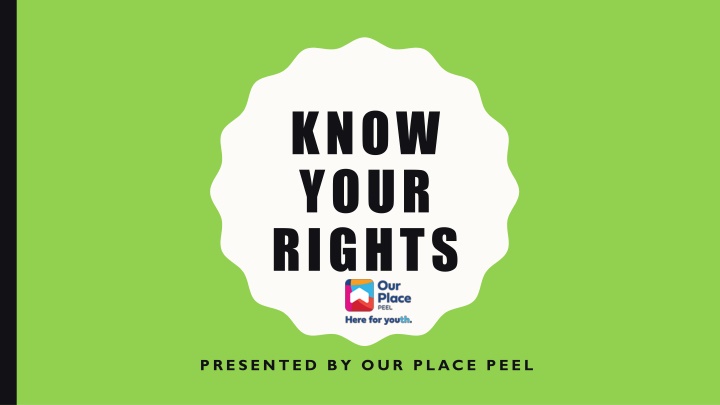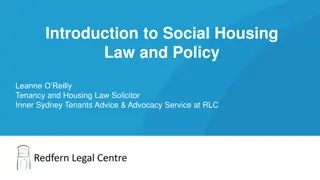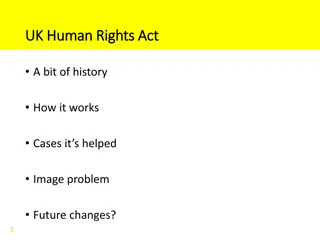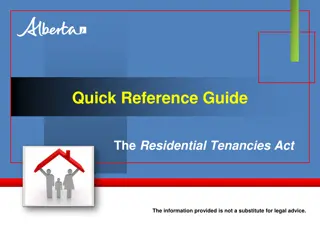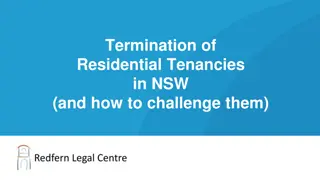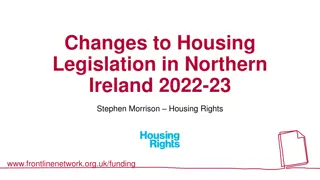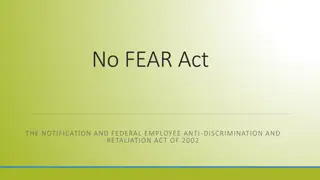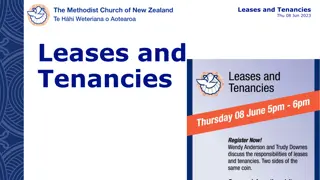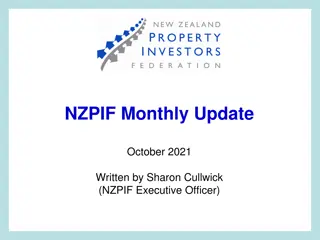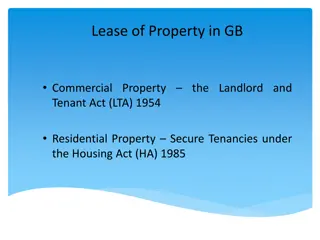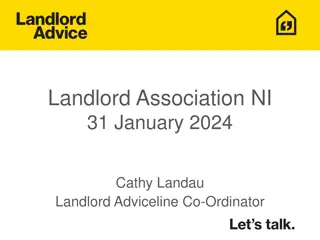Know Your Rights: Residential Tenancies Act Overview
This informative content delves into tenant and landlord rights as per the Residential Tenancies Act (RTA) in Ontario. It covers common questions about rental rules, responsibilities, reasons for eviction, and where to seek help. Explore rights, responsibilities, limitations, and lawful procedures relating to renting accommodation under the RTA.
Download Presentation

Please find below an Image/Link to download the presentation.
The content on the website is provided AS IS for your information and personal use only. It may not be sold, licensed, or shared on other websites without obtaining consent from the author.If you encounter any issues during the download, it is possible that the publisher has removed the file from their server.
You are allowed to download the files provided on this website for personal or commercial use, subject to the condition that they are used lawfully. All files are the property of their respective owners.
The content on the website is provided AS IS for your information and personal use only. It may not be sold, licensed, or shared on other websites without obtaining consent from the author.
E N D
Presentation Transcript
KNOW YOUR RIGHTS PRESENTED BY OUR PLACE PEEL
AGENDA COMMON QUESTIONS ABOUT RENTAL RULES RESIDENTIAL TENANCIES ACT RULES AND REGULATIONS TENANT AND LANDLORD RIGHTS AND RESPONSIBILITIES REASONS FOR EVICTION WHERE TO GO FOR HELP
COMMON QUESTIONS ABOUT RENTING What are my rights and responsibilities as a tenant? What rights and responsibilities do Landlords have? How often and how much can my landlord raise my rent? How much notice does a landlord need to give me when entering my unit? What are the lawful and unlawful reasons for eviction? What to do if I m getting evicted/want to end my tenancy?
ALL OF THESE QUESTIONS WILL BE ANSWERED USING INFORMATION FROM: THE RESIDENTIAL TENANCIES ACT
RESIDENTIAL TENANCIES ACT The Residential Tenancies Act, 2006 (RTA) was proclaimed and came into effect on January 31, 2007, to create a rental housing system that protects tenants, helps landlords and promotes investment in Ontario s rental housing market. The RTA covers most rental accommodations but not all. There are situations where the Residential Tenancies Act (RTA) does not apply. The RTA does not protect people living in: Emergency shelters; Hospitals or nursing homes (also called long-term care facilities); Prison; Student residence or dormitories; Temporary or seasonal use units; or Units that sharing a kitchen or bathroom with the landlord or a member of their immediate family. If the RTA does not apply to you, there is still support available!
TENANT RIGHTS AND RESPONSIBILITIES Rights as a tenant Right to a safe home in good repair Right to vital services - heating, hot and cold water. (your landlord cannot shut off these services unless for repairs even if you have not paid your rent) Right to heat and central air if applicable heating from Sept 1stto June 15thand air no more than 26 degrees between June/Sept Right to rent raising limitations landlords can only raise your rent once in a 12 month period Right to protection from unlawful eviction if your landlord tries to evict you, you have a right to a hearing with the Landlord and Tenant Board Right to documents you have a right to obtain a copy of your lease agreement, Landlord s legal name and address, and rent receipts Responsibilities as a tenant Pay your full rent on time on the day as agreed upon in your lease agreement Keep your home reasonably clean Repair damage that you or your guests cause any damage or breakage that occurs beyond regular use Be reasonably quiet Do your best to not disturb any other tenants or individuals living around you Obey the law regarding laws about overcrowding, etc.
LANDLORD RIGHTS AND RESPONSIBILITIES Rights as a Landlord Right to choose a tenant using income information, credit checks, credit references, rental history landlords cannot deny a tenant due to race, place of origin, ethnic origin, religion, sex, age, sexual orientation, marital status, family status, or disability. Right to collection of rent entitled to collect rent, in full on the day that it is due Right to entry of the rental unit following specific entry guidelines Right to increase rent once every 12 months, following rental increase guidelines Right to eviction of tenants for certain reasons only if tenant does not agree, must have a hearing with landlord and tenant board Responsibilities as a Landlord Maintain and repair the home Maintaining common areas such as yards (cutting grass and snow removal) Providing access to vital services (heat, hot/cold water/gas) Heating and cooling the home during specific months Providing documents such as lease agreement, legal name and address, and rent receipts landlords cannot charge a fee for these documents
IMPORTANT! A L A N D L O R D C A N N O T C H A N G E A N Y O F T H E S E R E S P O N S I B I L I T I E S B Y M A K I N G A V E R B A L O R W R I T T E N A G R E E M E N T W I T H T H E T E N A N T . I F T H E L A N D L O R D I N C L U D E S C O N D I T I O N S I N A L E A S E T H A T C O N T R A D I C T T H E S E R E S P O N S I B I L I T I E S , T H O S E C O N D I T I O N S A R E N O T V A L I D
RAISING RENT PRICES Your landlord CAN raise your rent one time within a 12 month period - this cannot take place within 12 months of your tenancy (you moving in). They must give you 90 days written notice before the increase For 2019 the rent increase is 1.8% however in 2020 it will be raising to 2.2% For example if your rent was $1000, and the increase is 2.2% you would pay an extra $22 for a new monthly total of $1022.
LANDLORD ENTERING YOUR RENTAL UNIT Only enter between 8am and 8pm 24 Explain why they need to enter hours notice Landlords can enter your unit for the following reasons: Fix something or check that things are working (like your oven, fridge or air conditioner) Make sure your home is safe (following the laws for safety and standards i.e. checking your smoke detectors) Show the home to someone who wants to buy it, or to an insurer or mortgage lender Look over your home before the building is turned into a condominium These are some of the common reasons that landlords have for wanting to come into your home. But, your landlord can come into your home for most reasonable purposes.
LANDLORD ENTERING YOUR RENTAL UNIT When you re moving out Your landlord can come into your home to show it to someone who might live there when you move out. In this case, your landlord does not have to tell you in writing before coming in. But they must try to let you know first. Your landlord can only show your home to another person when: You and your landlord have agreed that you will be moving out; or You have decided to leave; or Your landlord has asked you to leave Remember, your landlord can only bring another person into your home between 8 a.m. and 8 p.m.
IMPORTANT! IN T HE CASE O F AN EMERGENCY ( FIRE,FLOOD , ETC.) A LANDLORD DOES NOT HAVE TO GIVE YOU NOTICE TO ENTER
REASONS FOR EVICTION You CAN be evicted if: You CAN NOT be evicted if: You have children, or your children are noisy. You have pets (unless it disturbs others). You ask for repairs. You join a tenant association. You don't pay your rent, or you frequently pay your rent late. You or your guest do something illegal in your unit or building. You cause excessive damage to the apartment or building. You or your guest unreasonably disturb the landlord or other tenants in the building. You have too many people living in the unit. In this case, "too many" means a number that is against health, safety or housing standards. You lied about your income when you applied to rent the unit. The owner or a member of the owner's family wants to move into your apartment. In this case, "family" means spouse, child, parent, spouse's child, spouse's parent or a caregiver for any of them. The owner will destroy the building, make extensive repairs that require the unit to be empty, or change the unit so that it is no longer used as housing. A landlord cannot physically remove you from the home. He or she must file an application with the Landlord and Tenant Board first. In most cases, the Landlord and Tenant Board will hold a hearing, and if the board decides that you can be evicted, only the Sheriff can physically evict you.
IN THE CASE OF NOTICE OF EVICTION Read the notice to see why and when the landlord is asking you to leave. You may want to: talk to the landlord about the notice and correct any problems, if possible. leave the unit. stay in the unit and see if the landlord files an application with the LTB. You will have a chance to explain the situation at a hearing. You have the right to stay in your unit until the LTB issues an eviction order.
ENDING TENANCY There are certain rules when it comes to ending your tenancy or breaking your lease. Breaking a lease refers to when you re leaving your accommodation before the outlined timeframe in your lease agreement with your landlord. For example, a tenant may sign a lease for a year, but may want to move after 8 months this can be agreed upon in writing by a landlord and tenant If a landlord does not agree with breaking a lease they may require you to assign the unit to another tenant for the remainder of your lease (the remaining 4 months) Whenever you wish to leave your accommodation and move somewhere else, it is required to give 60 days notice to your landlord
Landlord and Tenant Board (LTB) The Landlord and Tenant Board s role is to provide information about the Residential Tenancies Act and to resolve disputes between most residential landlords and tenants. www.ltb.gov.on.ca 416-645-8080/1-888-332-3234 Legal Aid Ontario Legal Aid Ontario provides legal assistance for individuals with low income. This service can help with any legal advice and can be helpful in landlord/tenant situations. www.legalaid.on.ca 416-979-1466/1-800-668-8258 Advocacy Centre for Tenants Ontario (ACTO) The advocacy Centre for Tenants Ontario works to better the housing situation of Ontario residents who have low incomes, and those who are homeless. Their website has informative tip sheets on a variety of different tenant issues. www.acto.ca Even if your rental situation does not apply to the Residential Tenancies Act you can still receive advice and support SUPPORTS AVAILABLE If you ever find yourself in a situation where you are having problems or conflict with your landlord, utilize these supports! Take a photo of this screen or add these contacts to your phone - whatever helps you to remember where to go for help.
THANK YOU FOR PARTICIPATING WE HOPE THIS INFORMATION WAS HELPFUL!
